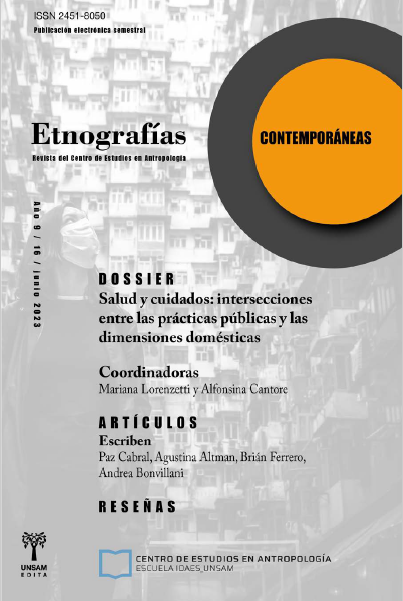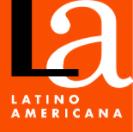Cuidar: un concepto fluido para compromisos adaptables
Abstract
References
Abrahamsson, Sebastian, and Endre Dányi (2019). “Becoming Stronger by Becoming Weaker: The Hunger Strike as a Mode of Doing Politics.” Journal of International Relations and Development 22: 882–98.
Akrich, Madeleine (1992). “The De-Scription of Technical Objects.” In Shaping Technology/ Building Society, edited by Wiebe Bijker and John Law, 215–24. Cambridge: MIT Press.
Akrich, Madeleine, and Bernike, Pasveer (2000). “Multiplying Obstetrics: techniques of Surveillance and Forms of Coordination.” Theoretical Medicine and Bioethics 21: 63–83.
Benouniche, Maya, Zwarteveen, Margreet and Kuper, Marcel (2014). “Bricolage as Innovation: Opening the Black Box of Drip Irrigation Systems.” Irrigation and Drainage 63(5): 651–58.
Bensing, Jozien (1991). “Doctor-Patient Communication and the Quality of Care.” Social Science & Medicine 32(11): 1301–10.
Boltanski, Luc, and Thévenot, Laurent (2006). On Justifcation: Economies of Worth. Princeton: Princeton University Press.
Both, Rosalijn (2015). “Emergency Contraceptive Use in Addis Ababa, Ethiopia: Challenging Common Assumptions About Young People’s Contraceptive Practices.” Reproductive Health Matters 23(45): 58–67.
Bowden, Peta (2000). “An ‘Ethic of Care’ in Clinical Settings: Encompassing ‘Feminine’ and ‘Feminist’ Perspectives.” Nursing Philosophy 1(1): 36–49.
Brannelly, Tula (2006). “Negotiating Ethics in Dementia Care: An Analysis of an Ethic of Care in Practice.” Dementia 5(2): 197–212.
Brugère, Fabienne (2017). L’éthique du ‘care’: Que sais-je? [The Ethics of Care: What Do I Know?] Paris: Presses Universitaires de France. Corbin, Juliet, and Anselm Strauss. 1988. Unending Work and Care: Managing Chronic Illness at Home. San Francisco: Jossey-Bass.
Dányi, Endre (2020). “Buskomor Politics: Practicing Critique in the Ruins of Liberal Democracy.” In On Other Terms: Interfering in Social Science English, edited by Annemarie Mol and John Law, 96–108. Sociological Review Monograph. London: Sage Publications.
De Laet, Marianne, and Mol, Annemarie (2000). “The Zimbabwe Bush Pump: Mechanics of a Fluid Technology.” Social Studies of Science 30(1): 225–63.
De Langen, Maja (2018). Interactions with Persistent Pain: Knowing and Enacting the Painful Body. MA thesis, Department of Anthropology, University of Amsterdam.
De Swaan, Abram (1982). De mens is de mens een zorg: Opstellen 1971–1981 [One Human Is the Object of Care of Another Human: Essays 1971–1981]. Amsterdam: Meulenhof.
De Swaan, Abram (1988). In Care of the State: Health Care, Education and Welfare in Europe and the USA in the Modern Era. Cambridge: Polity Press.
De Wilde, Mandy, and Jan Willem Duyvendak (2016).“Engineering Community Spirit: The Pre-Figurative Politics of Affective Citizenship in Dutch Local Governance.” Citizenship Studies 20(8): 973–93.
Dodier, Nicolas. 1993. “Action as a Combination of ‘Common Worlds.’” The Sociological Review 41(3): 556–71.
Dodier, Nicolas (2015). Leçons politiques de l’epidémie de sida [Political Lessons of the AIDS Epidemic]. Paris: Editions de l’Ecole des Hautes Etudes en Sciences Sociales.
Duyvendak, Jan Willem (1995). “De Hollandse aanpak van een epidemie: Of waarom Act Up! in Nederland niet kon doorbreken” [The Dutch Way of Handling an Epidemic: Or Why Act Up! Could Not Emerge in the Netherlands]. Acta Politica 2: 189–214.
Elias, Norbert (1978). What Is Sociology? New York: Columbia University Press.
Fisher, Berenice, and Tronto, Joan (1990). “Toward a Feminist Theory of Caring.” In Circles of Care: Work and Identity in Women’s Lives, edited by Emily Abel and Margaret Nelson, 35–62. Albany, NY: SUNY Press.
Gilligan, Carol (1977). “In a Different Voice: Women’s Conceptions of Self and of Morality.” Harvard Educational Review 47(4): 481–517.
Habermas, Jürgen (2015) [1981]. The Theory of Communicative Action: Lifeworld and Systems, a Critique of Functionalist Reason. Hoboken, NJ: John Wiley and Sons. (Hay traduccion espanola: Teoría de la acción comunicativa. Madrid, Taurus, 1981)
Hardon, Anita (1997). “Women’s Views and Experiences of Hormonal Contraceptives: What We Know and What We Need to Find Out.” In Beyond Acceptability: Users’ Perspectives on Contraception, edited by T.K. Sundari Ravindran, et al., 68–77. London: Reproductive Health Matters for the World Health Organization.
Hardon, Anita, Desclaux, Alice, Egrot, Marc, Emmanuelle Simon, Emmanuelle, Micollier, Evelyne and Kyakuwa, Margaret (2008). “Alternative Medicines for AIDS in Resource-Poor Settings: Insights from Exploratory Anthropological Studies in Asia and Africa.” Journal Ethnobiology and Ethnomedicine 4: 16.
Hardon, Anita, and Dilger, Hans-Jörg (2011). “Special Issue Introduction: Global AIDS Medicines in East African Health Institutions.” Medical Anthropology 30(2): 136–57.
Hardon, Anita, and Nurun Ilmi Idrus, Nurun (2015). “Magic Power: Changing Gender Dynamics and Sex-Enhancement Practices Among Youths in Makassar, Indonesia.” Anthropology & Medicine 22(1): 49–63.
Hardon, Anita, and Moyer, Eileen (2014). “Editorial. Anthropology of AIDS: Modes of Engagement.” Medical Anthropology 33(4): 255–62.
Hardon, Anita and Posel, Deborah (2012).“Editorial Introduction: Secrecy as Embodied Practice: Beyond the Confessional Imperative.” Culture, Health & Sexuality 14: 1–13.
Hardon, Anita, et al. (2007). “Hunger,Waiting Time and Transport Costs: Time to Confront Challenges to ART Adherence in Africa.” AIDS Care 19(5): 658–65.
Hardon, Anita, et al.(2019). “Sexual and Reproductive Self Care Among Women and Girls: Insights from Ethnographic Studies.” British Medical Journal 365: L1333.
Heldal, Frode (2010). “Multidisciplinary Collaboration as a Loosely Coupled System: Integrating and Blocking Professional Boundaries with Objects.” Journal of Interprofessional Care 24(1): 19–30.
Heritage, John, and. Maynard, Douglas W (2006). “Problems and Prospects in the Study of Physician-Patient Interaction: 30 Years of Research.” Annual Review of Sociology 32: 351–74.
Herzlich, Claudine, and Pierret, Janine. (1984). Malades d’hier, malades d’aujourd’hui: de la mort collective au devoir de guérison [The Sick of Yesterday, the Sick of Today: From Collective Death to the Obligation to Heal]. Paris: Payot.
Hochschild, Arlie (1989). The Second Shift: Working Families and the Revolution at Home. London: Penguin.
Hochschild, Arlie (2012). The Managed Heart: Commercialization of Human Feeling. Berkeley: University of California Press.
Honig, Bonnie (1994). “Difference, Dilemmas, and the Politics of Home.” Social Research 61(3): 563–97.
Klinkenberg, Marianne, Willems, Dick, Onwuteaka-Philipsen, Bregje, Deeg, Dorly and van der Wal, Gerrit (2004). “Preferences in End-of-Life Care of Older Persons: After-Death Interviews with Proxy Respondents.” Social Science & Medicine 59(12): 2467–77.
Kuipers, Giselinde (2012).“The Rise and Decline of National Habitus: Dutch Cycling Culture and the Shaping of National Similarity.” European Journal of Social Theory 16(1): 17–35.
Kuipers, Giselinde and Franssen, Thomas (2021). “Qualification” in Bowen,
John R., Dodier, Nicolas, Duyvendak, Jan Willem and Hardon, Anita (2021). Pragmatic Inquiry. Critical Concepts for Social Sciences, Routledge.
Kulick, Don, and Rydström, Jens (2015). Loneliness and Its Opposite: Sex, Disability, and the Ethics of Engagement. Durham: Duke University Press.
Kyakuwa, Margaret and Hardon, Anita (2012). “Concealment Tactics Among HIV-Positive Nurses in Uganda.” Culture, Health & Sexuality 14(1): 123–33.
Latour, Bruno (1996). Aramis, or, the Love of Technology. Cambridge: Harvard University Press.
Law, John (2002). Aircraft Stories: Decentering the Object in Technoscience. Durham: Duke University Press.
Law, John (2010). “Care and Killing: Tensions in Veterinary Practice.” In Care in Practice: On Tinkering in Clinics, Homes and Farms, edited by Annemarie Mol, Ingunn Moser, and Jeannette Pols, 57–72. Berlin: Transcript.
Law, John, and Joks, Solveig (2018) “Indigeneity, Science, and Difference: Notes on the Politics of How.” Science, Technology, & Human Values 44(3): 424–47.
Lettinga, Ant and Mol, Annemarie (1999).“Clinical Specificity and the Non- Generalities of Science.” Theoretical Medicine and Bioethics 20(6): 517–35.
Lévi-Strauss, Claude (1962). La pensée sauvage [The Savage Mind]. Paris: Plon (Hay traduccion espanola: El pensamiento salvaje. Mexico, Fondo de Cultura Economica, 1964).
Mol, Annemarie (1987). “Eet mama ons op? En andere verhalen over moedertje staat” [Does Mama Gobble Us Up? And Other Stories About Mother State]. Groniek 97: 9–25.
Mol, Annemarie (2000). “What Diagnostic Devices Do: The Case of Blood Sugar Measurement.” Theoretical Medicine Medicine and Bioethics 21: 9–22.
Mol, Annemarie (2002a). The Body Multiple: Ontology in Medical Practice. Durham: Duke University Press.
Mol, Annemarie (2002b). “Cutting Surgeons, Walking Patients: Some Complexities Involved in Comparing.” In Complexities: Social Studies of Knowledge Practices, edited by John Law and Annemarie Mol, 218–57. Durham: Duke University Press.
Mol, Annemarie (2006). “Proving or Improving: On Health Care Research as a Form of Self-Refection.” Qualitative Health Research 16(3): 405–14.
Mol, Annemarie (2008). The Logic of Care: Health and the Problem of Patient Choice. London: Routledge.
Mol, Annemarie, and Berg, Marc (1994).“Principles and Practices of Medicine.” Culture, Medicine and Psychiatry 18(2): 247–65.
Mol, Annemarie and Law, John (1994). “Regions, Networks and Fluids: Anaemia and Social Topology.” Social Studies of Science 24(4): 641–71.
Mol, Annemarie, and Law, John (2004). “Embodied Action, Enacted Bodies: The Example of Hypoglycaemia.” Body & Society 10(2–3): 43–62.
Mol, Annemarie, Moser, Ingunn and Pols, Jeannette. (2010). “Care: Putting Practice into Theory.” In Care in Practice: On Tinkering in Clinics, Homes and Farms, edited by Mol, Annemarie, Moser, Ingunn and Pols, Jeannette 7–27. Berlin: Transcript.
Moser, Ingunn (2005). “On Becoming Disabled and Articulating Alternatives: The Multiple Modes of Ordering Disability and Their Interferences.” Cultural Studies 19(6): 667–700.
Moser, Ingunn (2010). “Perhaps Tears Should Not Be Counted But Wiped Away? On Quality and Improvement in Dementia Care.” In Care in Practice: On Tinkering in Clinics, Homes and Farms, edited by Annemarie Mol, Ingunn Moser, and Jeannette Pols, 277–300. Berlin: Transcript.
Paperman, Patricia (2013). Care et sentiments [Care and Feelings]. Paris: Presses Universitaires de France.
Pasveer, Bernike, and Akrich, Madeleine (2001). “Obstetrical Trajectories.” In Birth by Design: Pregnancy, Maternity Care, and Midwifery in North America and Europe, edited by DeVries, Raymond, Wrede, Sirpa, van Teijlingen, Edwin and Benoit, Cecilia, 229–42. London: Routledge.
Pols, Jeannette (2005). “Enacting Appreciations: Beyond the Patient Perspective.” Health Care Analysis 13(3): 203–21.
Pols, Jeannette (2006). “Washing the Citizen: Washing, Cleanliness and Citizenship in Mental Health Care.” Culture, Medicine and Psychiatry 30(1): 77–104.
Pols, Jeannette (2012). Care at a Distance: On the Closeness of Technology. Amsterdam: Amsterdam University Press.
Pols, Jeannette (2013). “Through the Looking Glass: Good Looks and Dignity in Care.” Medicine, Health Care and Philosophy 16(4): 953–66.
Pols, Jeannette, and Moser, Ingunn (2009). “Cold Technologies Versus Warm Care? On Affective and Social Relations With and Through Care Technologies.” Alter: European Journal of Disability Research 3(2): 159–78.
Porter, Elisabeth J. (2006).“Can Politics Practice Compassion?” Hypatia 21(4): 97–123.
Puig de la Bellacasa, Maria (2017). Matters of Care: Speculative Ethics in More Than Human Worlds. Minneapolis: University of Minnesota Press.
Rathgeber, Eva (1996). “Women, Men, and Water-Resource Management in Africa.” In Water Management in Africa and the Middle East: Challenges and Opportunities, edited by Eglal Rached, Eva Rathgeber, and David Brooks, 49–69. Ottawa: IDRC.
Redfeld, Peter (2016). “Fluid Technologies: The Bush Pump, the LifeStrawR and Microworlds of Humanitarian Design.” Social Studies of Science 46(2): 159–83.
Rose, Nikolas, and Miller, Peter (2013). Governing the Present: Administering Economic, Social and Personal Life. Hoboken, NJ: John Wiley and Sons.
Sloterdijk, Peter (2011). Spheres Trilogy: An Investigation of Humanity’s Engagement with Intimate Spaces. Los Angeles, CA: Semiotext(e).
Struhkamp, Rita, Mol, Annemarie and Swierstra, Tsjalling (2009). “Dealing with In/Dependence: Doctoring in Physical Rehabilitation Practice.” Science, Technology, & Human Values 34(1): 55–76.
Ticktin, Miriam I. (2011). Casualties of Care: Immigration and the Politics of Humanitarianism in France. Berkeley: University of California Press.
Tronto, Joan (1993). Moral Boundaries: A Political Argument for an Ethic of Care. Hove, East Sussex: Psychology Press.
Tronto, Joan (2013). Caring Democracy: Markets, Equality, and Justice. New York: New York University Press.
Watters, Charles (2007). “Refugees at Europe’s Borders: The Moral Economy of Care.” Transcultural Psychiatry 44(3): 394–417.
Weeks, Kathi (2011). Feminism, Marxism,Anti-Work Politics, and Postwork Imaginaries. Durham: Duke University Press.
Whyte, Susan, van der Geest, Sjaak and Hardon, Anita (2002). Social Lives of Medicines. Cambridge: Cambridge University Press.
























